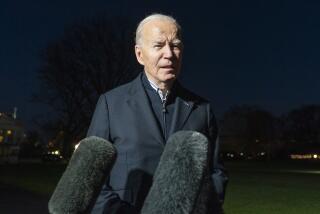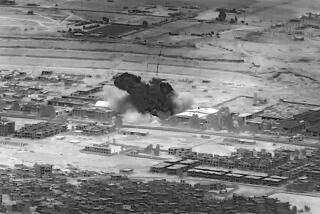6 suspected of smuggling bombs from Iran captured
- Share via
BAGHDAD — Five U.S. soldiers were killed in attacks across Iraq, the U.S. military said Friday, and six suspected militants thought to have smuggled roadside bombs from Iran were captured in northeast Baghdad.
Meanwhile, a top Shiite Muslim political leader flew to the United States for medical tests. Abdelaziz Hakim, who heads the Supreme Islamic Iraqi Council, known until last week as the Supreme Council for Islamic Revolution in Iraq, suffers from high blood pressure. A week ago doctors recommended he get more thorough testing in the U.S., a member of his party said.
Some Western experts said the change in the group’s name was meant to distance the party, which has 30 seats in parliament, from Iran, its chief patron from its founding in 1982 until after the U.S.-led invasion of Iraq in 2003.
Three of the U.S. fatalities occurred Friday when an explosion ripped into the soldiers’ vehicle in Diyala province northeast of Baghdad. The region has a volatile mix of Shiite militias and Sunni Arab insurgents.
The area’s senior U.S. commander told reporters this month that he needed more troops in Diyala, where forces have been plagued by armor-piercing explosives known as EFPs, or explosively formed projectiles, that the U.S. military alleges are smuggled in from Iran.
The Associated Press, citing Iraqi Interior Ministry officials, reported that insurgents Friday attacked U.S. and Iraqi military positions in Baqubah, the capital of Diyala, but were repelled by Iraqi forces, backed up by American firepower and helicopters. However, U.S. military spokesman Army Lt. Col. Christopher Garver said the Army had no record of any such attack.
In southwest Baghdad, two U.S. soldiers died and nine were wounded in separate attacks Thursday as they conducted operations in an area where they uncovered weapons and detained suspected extremists. The military did not reveal further details.
The killings raised the U.S. military’s death toll in the Iraq theater to 3,409, according to the website icasualties.org, which tallies U.S. casualties in the war.
Fifty-eight U.S. soldiers have died this month. The fatalities come with the U.S. military under heavy political pressure to show that its troop offensive in the Baghdad area is achieving results.
The suspected militants rounded up Friday were thought to be smuggling armor-piercing bombs from Iran to northeast Baghdad. The mostly Shiite area, home to Sadr City, is a stronghold of radical cleric Muqtada Sadr’s Al Mahdi militia.
“The individuals targeted during the raids are suspected members of a secret cell terrorist network known for facilitating the transport of weapons and explosively formed penetrators, or EFPs, from Iran to Iraq, as well as bringing militants from Iraq to Iran for terrorist training,” the U.S. military said in a statement.
One of the detainees is believed to be “responsible for the planning and coordinating of numerous murders, kidnappings, assassinations and attacks on Iraqi civilians and coalition forces,” the statement said. Garver, the military spokesman, said the network previously had been targeted by the Americans, but declined to provide details.
The U.S. military also reported that it found two weapons caches Tuesday in northwest Baghdad that included materials for armor-piercing bombs.
The Americans believe the devices, which can punch holes in Humvees and heavier armored vehicles, are used primarily by Shiite militias, particularly factions within Sadr’s group. Iran’s Shiite regime is alleged to be aiding both Iraqi Shiite militias and Sunni insurgents.
South of Baghdad, U.S. troops continued to search for three American soldiers, including Pfc. Joseph J. Anzack Jr. of Torrance, believed to have been abducted Saturday by an Al Qaeda affiliate.
About 4,000 U.S. military personnel and 2,000 Iraqi troops were on the hunt one week after the attack, which killed four U.S. soldiers and an Iraqi interpreter. The Defense Department on Friday announced the name of the fourth soldier killed in the ambush, whose body had been badly burned. The Pentagon identified him as Sgt. Anthony J. Schober, 23, of Reno. On the ground, officers vowed not to let up in their search.
“It is the same mission. There is no letup or change,” said U.S. Army spokesman Lt. Col. Randy Martin. “I don’t see any scaling down of that effort.”
Five unidentified bodies were found in Babil province, just south of the massive dragnet for the missing Americans, police said.
A source from the Sunni Waqf endowment in Basra said that eight Sunni men disappeared Thursday night as they accompanied an injured man to the city hospital. Basra, in the largely Shiite south, is Iraq’s second-largest city. In the past, Shiite militias have kidnapped Sunni men from hospitals.
In northern Iraq, a policeman was killed in Kirkuk, and in Baghdad, police said that 25 unidentified bodies with gunshot wounds were found dumped around the city. The previous day, 30 corpses were discovered in the capital.
Clashes erupted between police commandos and gunmen on Baghdad’s airport road, a place noted for violence by both Sunni and Shiite extremists. Police said that one officer was killed in the fighting.
In addition, a car bombing claimed the lives of two Iraqis in Baghdad, police said.
Times staff writers Saif Hameed, Said Rifai, Zeena Kareem, Raheem Salman and Suhail Ahmad contributed to this report.
More to Read
Sign up for Essential California
The most important California stories and recommendations in your inbox every morning.
You may occasionally receive promotional content from the Los Angeles Times.









